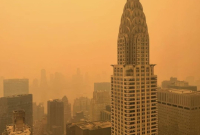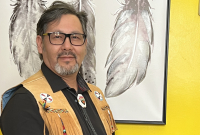Support strong Canadian climate journalism for 2025
On Aug. 2, 2014, six weeks into the wildfire season that would come to be known as the Summer of Smoke, we woke up to haze over Back Bay in Yellowknives Dene territory. It was my daughter Vivi’s first birthday and we’d planned a party in the park.
I looked at my husband, a pediatrician. Should we cancel? Most people don’t have air conditioning in the North, so it had been six weeks of trying to entertain sweaty children in diapers indoors with the windows closed — after a long winter. We decided to go to the park. Breastfeeding later beside the respirologist and her seven-month-old, we looked at the smoke curling around the corners of the park and asked, “What is this doing to our kids’ lungs?”
That was the start of a Health Canada-funded study that involved people from the Yellowknives Dene and Ka'a'gee Tu First Nation and scholars from across the country. Our two-and-a-half-month smoke exposure was one of the worst in the global literature base.
We found a full doubling of ER visits for asthma and a 50 per cent increase in visits for pneumonia. Analysis of 30 video interviews with community members revealed themes of irritation and anxiety, a reduction in physical activity, a feeling of separation from the land and many expressions of worry about what this summer meant for people’s children into the future.
The final theme, a striking one, was the people who had prepared the most by fire-smarting their homes, lining boats up beside the river in case the highway got blocked and opening up recreation facilities for free so people could go in and exercise in clean air, felt the best. They sat up straight in their chairs and spoke with pride. Active planning and response to wildfires not only does good, but feels good.
We are not at a new normal — wildfires will continue to worsen.
Under all feasible emissions scenarios, Canada will be about 2 C warmer than a 1986 to 2005 baseline by the time today’s toddlers are in their twenties.
The National Adaptation Strategy is a great start but has some glaring gaps, including a plan to address the health effects of wildfire smoke. Given the accelerating impacts of climate change, this strategy should be developed and funded in an iterative process, continuously responding to our changing challenges.
Municipalities should add smoke strategies to their heat response plans and have a trigger point at which recreation facilities open for free for exercise and socializing in clean air. Buy that HEPA filter — you will need it.
Unfortunately, we are now tracking a high-emissions scenario (RCP 8.5), which projects over 6 C of warming in Canada by the time toddlers are in their sixties. This will pose extreme challenges to health and the stability of supply chains and health systems — and leave many communities facing existential threats.
We need a hard cap on oil and gas emissions, an immediate end to public subsidies for the fossil fuel industry and a ban on oil and gas advertising. Many investments are not taking climate-related impacts and transitions into account: we need to pass the Climate-Aligned Finance Act in Canada and support the Bridgetown Initiative and other international efforts to align investments by multilateral banks, the International Monetary Fund and the private sector with a healthy response to climate change that supports lower- and middle-income countries.
With an official Health Day at COP28 and an inter-ministerial meeting on climate and health, we will be looking to countries to deliver a plan for a full phaseout of fossil fuels in order to steer us away from catastrophic tipping points in the Earth system. Failing to do this would be a devastating dereliction of our duty as parents and caregivers to the toddlers whose teeth we are brushing right now, and to the children they may one day have.
Fundamentally, to thrive through this climate-changed century, we must move beyond measurements of production via GDP to make well-being our explicit societal goal, as called for recently by both the United Nations and the World Health Organization.
Finance Canada has developed metrics to support a quality-of-life strategy. These should be foregrounded in budget decision-making to ensure we move towards a national project that is ecologically and economically efficient, and which provides a good life for all within the limits of what the planet can offer.
These transitions require us to find the courage to call for change in workplaces, communities and conversations with elected representatives. We need to make clear that re-election requires an adequate plan to tackle wildfires now and into the future.
Awkward conversations require courage. I would posit, however, that none of these will be more difficult than explaining to a toddler why they can’t go to the park due to smoke — and that they are essential to being able to meet that toddler’s eyes in 10 years.
Active planning and response to crises not only does good, it feels good.
Dr. Courtney Howard is an emergency physician in Yellowknives Dene territory, the vice-chair of the Global Climate and Health Alliance, a community research fellow in planetary health at the Dahdaleh Institute for Global Health Research, and a master of public policy candidate at the Blavatnik School of Government at Oxford University.






Comments
I am afraid this article is too polite and will not have the impact needed. I am angry and frustrated that the government has only tinkered at the edges of the matter. We are sleepwalking into climate disaster.
I started talking to “my” MP, a Liberal, in 2016. It has done no good. Later, I accompanied two friends to meet with him, and at one point the MP told one of them to “shut up”. The MP clearly did not want to hear the message again. He now has a senior position in the government. I do not know how we can win the fight with the government.